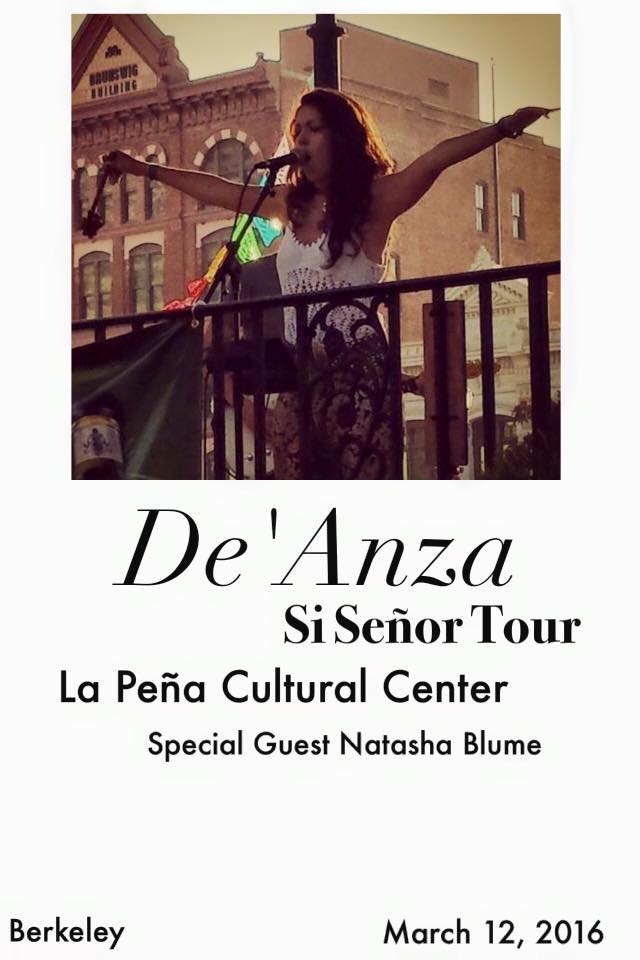 $10 ADVANCE, $12 DOOR
$10 ADVANCE, $12 DOOR
 De’Anza (Sounds like: Anita Tijoux, Lila Downs, and more)
De’Anza (Sounds like: Anita Tijoux, Lila Downs, and more)
Pulling from various ends of the musical spectrum while taking cues from traditional mariachi sounds and blending layers of modern sonics, De’Anza is a breath of fresh air in a rather smoggy metropolis. Redefining what it is to be Latin Alternative, De’Anza creates an eclectic mix of music, crossing borders and boundaries, resulting in a new take on an old form.
“From hip-hop to jazz and everything in between, there’s no doubt that the United States is musically rich and, like many Latino bicultural homes, I was also exposed to music in Spanish at a very early age,” De’Anza says. “Being that my grandmother was Mexican, it definitely wasn’t uncommon to hear mariachi blasting from the speakers of her boombox. When I began writing music, it only felt natural to also represent that part of me.”
Joel Moya of Remezcla.com writes, “Despertar” is the first single and a hypnotic and catchy tune, thanks to a few plucks and strokes on a vihuela, some beats and, yes, that magical voice.”
With support from MTV Tres’ “La Hora Nacional,” NPR affiliated stations KEXP Seattle, 90.3fm, KLAX Berkeley, CA 90.7fm and KPFA Los Angeles 90.7 fm, Despertar is poised to convert any first-time listener within an earshot of “that magical voice.”
Amoeba Music, the world’s largest indie music retailer, has selected De’Anza to take part in its Home Grown artist program to coincide with the release of her EP for the month of March. This includes a running ad in LA Weekly newspaper, a feature on the retailer’s website and a prominent display of the EP inside its Hollywood store.
Her long-awaited EP debut Despertar will be released March 3, 2015, with spring and summer tour dates to follow.

Natasha Blume (Sounds like: a playful Lana del Rey with more interesting lyrics)
A living documentary, emerging poet laureate and wanderlust bohemian, Natasha’s music–like her life–is a story unfolding. Literally the daughter of a preacher man, she developed her musical roots performing in the churches her father ministered. Appointed principal keyboardist of the church band by age twelve, Natasha was given the mic at fourteen to lead congregations through their Pentecostal Christian revivals.
Empowered and motivated, she took her enthusiasm to any stage including the political–tenuring four years as class president. A momentum that was soon met with tragedy–including the loss of her father. Pain proves the birthplace of artistry, as Natasha secretly began to write what she had always understood as secular music, speaking to the angst and trappings of early adulthood through the eyes of an ambitious, type A and eventual sorority misfit. Traveling the world as a student enrolled in Semester at Sea, far from the church and its regiments, Natasha found her true voice performing these songs for both her alma mater and the anonymous passerby. Deciding to commit wholly, her arrival in Hollywood was picture perfect: hopelessly unemployed, unknowingly housed with a heroin-addicted prostitute and fending off induction by the nearby Church of Scientology.
Enter producer Jay Arr through a chance Hotel Roosevelt encounter that led to a miscegenation that literally writes the score of Natasha’s biography. His contemporary, apocalyptic compositions and her eerie vocal impertinence stretch the definition of a recycled pop genre with its soulful originality and powerful illustration of unspoken emotions.
Natasha Blume is less about tragedy itself, but the bittersweet reality of acceptance. Her songwriting expands upon these experiences and their asylum in a mesmerizing, urban electropop sound.

 De’Anza (Sounds like: Anita Tijoux, Lila Downs, and more)
De’Anza (Sounds like: Anita Tijoux, Lila Downs, and more)
